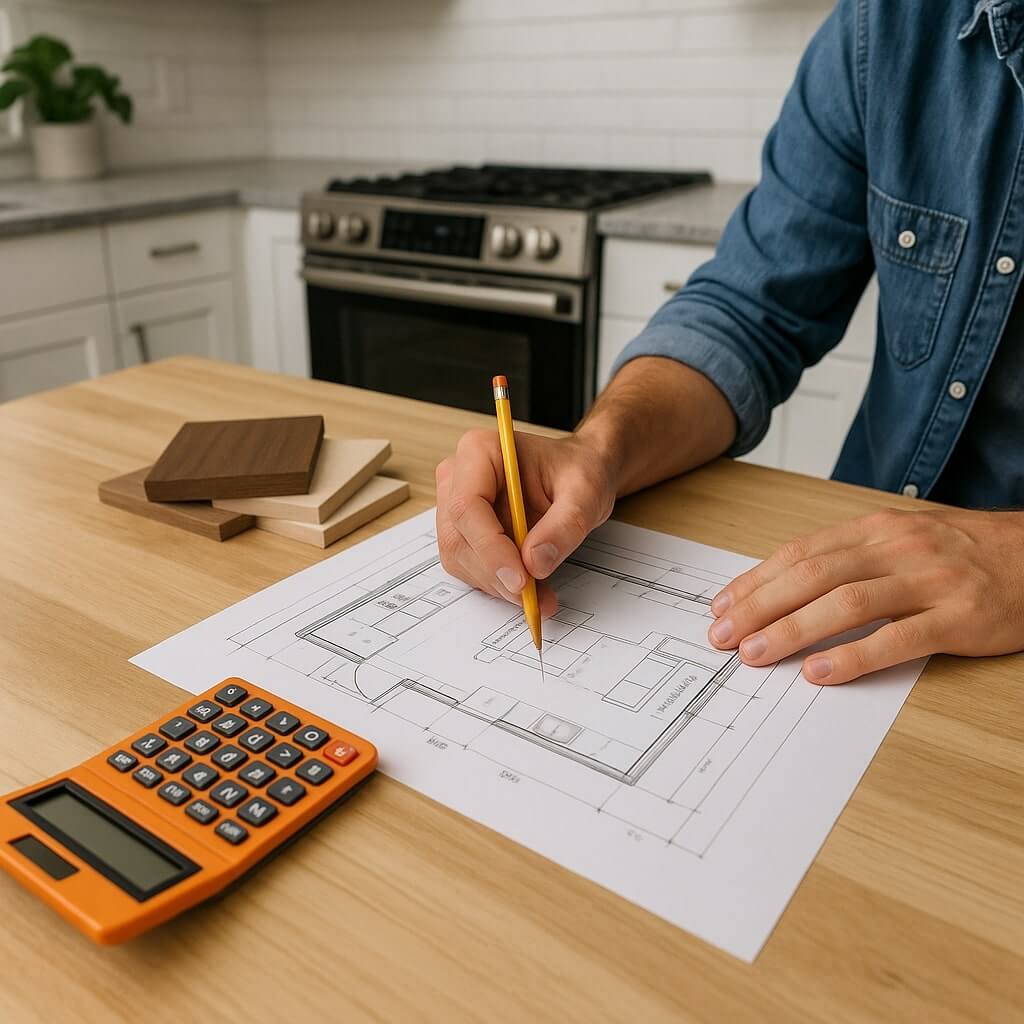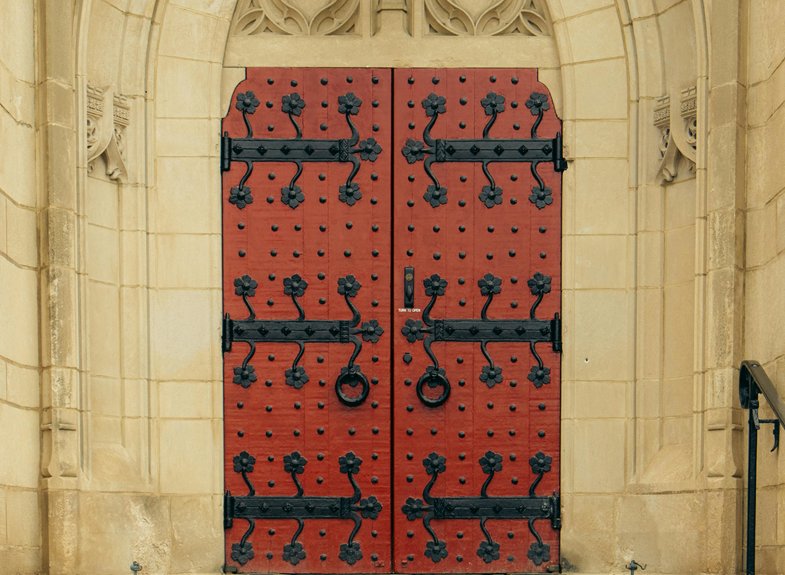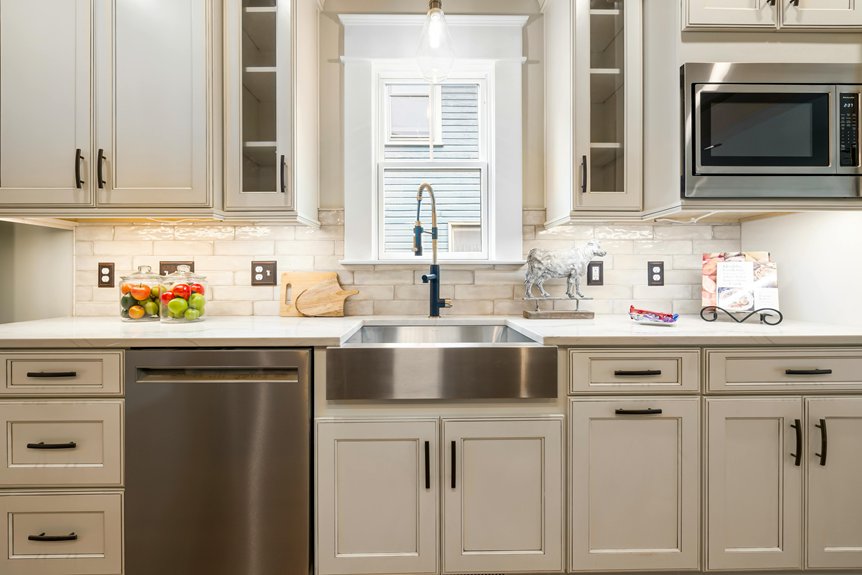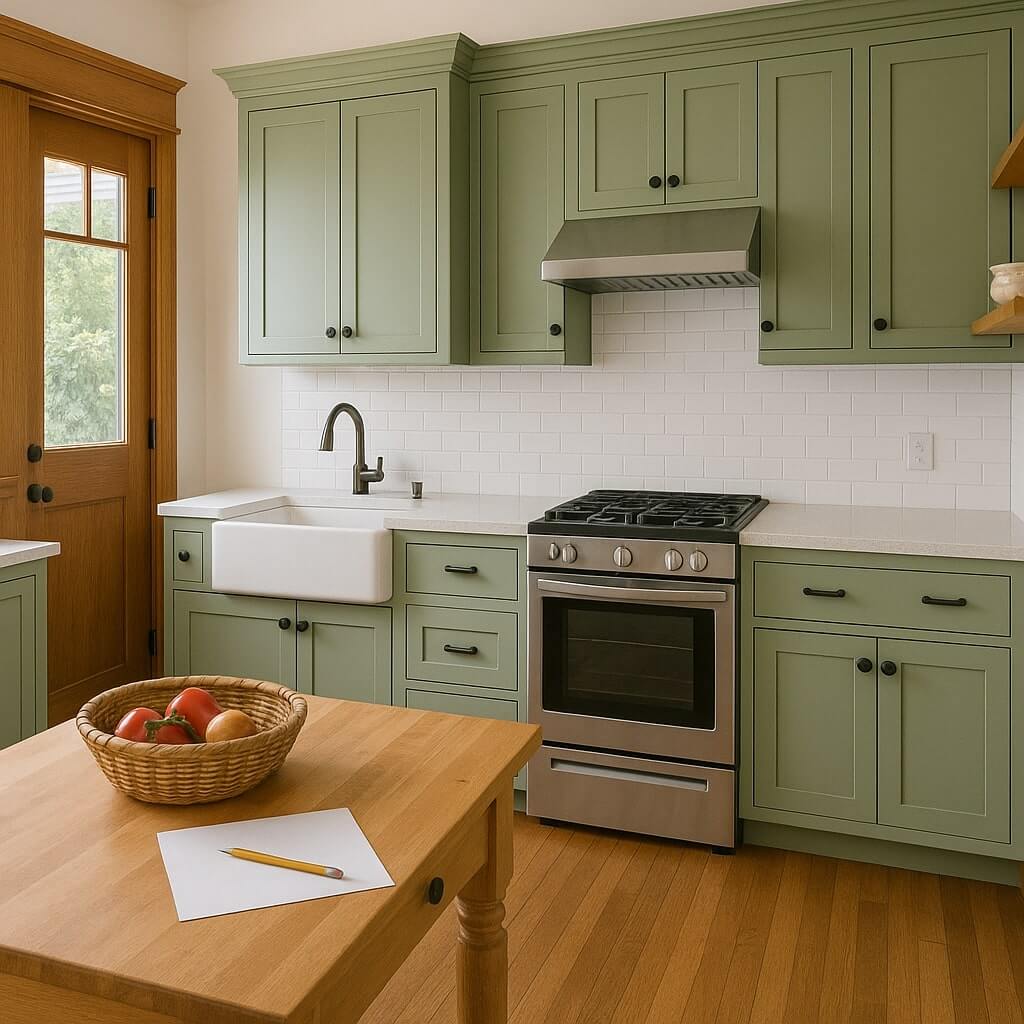When you’re planning a kitchen remodel in Portland, it’s essential to accurately estimate your costs. Start by defining your goals and preferences, then research local averages to set realistic expectations. Reflect on the key improvements you want, the materials you’ll use, and potential labor charges. Don’t forget about permits and unexpected expenses. Understanding these factors will help you align your vision with your budget, but there’s more to evaluate before you begin.
Key Takeaways
- Define your kitchen remodel goals to align design preferences with budget and functionality.
- Research average remodeling costs in Portland to establish a realistic budget.
- Create a detailed list of desired improvements, focusing on features that enhance functionality.
- Choose high-quality materials that balance aesthetics and durability within your budget.
- Factor in labor costs and additional expenses, including permits and inspections, for an accurate estimate.
Define Your Kitchen Remodel Goals
When planning a kitchen remodel, defining your goals is essential to guarantee a successful outcome.
Start by clarifying your design preferences. Do you lean towards modern minimalism or a warm farmhouse look?
Next, consider the kitchen layout. Do you need an open concept for entertaining, or do you prefer a more traditional design that separates cooking and dining areas?
These decisions will shape your project and impact your budget. By establishing clear goals, you’ll streamline the design process and create a functional space that reflects your style, ensuring every element contributes to an efficient and aesthetically pleasing kitchen.
Research Average Costs in Portland
Understanding the average costs of a kitchen remodel in Portland is essential for effective budgeting. Researching current average remodel expenses helps you align your expectations with reality.
In Portland, kitchen trends often influence costs considerably; for example, popular materials like quartz countertops and custom cabinetry can drive up expenses. By examining recent projects, you can identify what homeowners typically spend and discern which features are worth the investment.
Consider consulting local contractors and online resources to gather data on average prices. This knowledge empowers you to make informed decisions and tailor your remodel to fit both your vision and budget.
Create a Detailed List of Desired Improvements
To kick off your kitchen remodel, it’s essential to create a detailed list of desired improvements.
Start by identifying key features that will enhance both aesthetics and functionality, such as cabinetry, countertops, and appliances.
Once you have your list, prioritize your functional needs to guarantee the remodel aligns with your lifestyle and cooking habits.
Identify Key Features
A successful kitchen remodel hinges on identifying key features that align with your culinary needs and aesthetic preferences.
Start by evaluating your kitchen layout; consider how you move through the space and whether an open design or defined zones suits you.
Next, think about appliance selection; high-efficiency models can save energy and enhance functionality.
List essential features like a spacious island, ample counter space, or custom cabinetry that reflect your style.
Don’t forget about storage solutions and lighting, as these elements considerably impact both usability and atmosphere.
This detailed list will guide your decisions and budget effectively.
Prioritize Functional Needs
While planning your kitchen remodel, prioritizing functional needs is essential for creating a space that works seamlessly for your lifestyle.
Start by outlining a detailed list of desired improvements, focusing on how you use the kitchen daily.
Consider your kitchen layout: will an open concept serve you better?
Evaluate appliance placement—how can you arrange your refrigerator, stove, and sink for ideal workflow?
Think about storage solutions, counter space, and seating arrangements.
Choose the Right Materials
Choosing the right materials for your kitchen remodel is essential, as they directly impact both aesthetics and durability.
You’ll want to balance material quality with your budget, ensuring you invest in options that stand the test of time without breaking the bank.
Material Quality Importance
Quality plays an essential role in the success of your kitchen remodel, as the materials you select directly impact both the aesthetic and functional aspects of the space.
When choosing materials, consider their durability; high-quality options withstand daily wear and tear, ensuring longevity.
Additionally, the aesthetic appeal of your kitchen hinges on these choices. For instance, granite countertops offer both style and resilience, while laminate may lack the same durability.
Balancing material durability with visual charm can elevate your kitchen’s overall look and performance.
Make informed selections to create a space that’s beautiful, functional, and built to last.
Budget-Friendly Options
Finding budget-friendly options doesn’t mean compromising on style or functionality. To maximize your kitchen remodel without breaking the bank, focus on cost-saving strategies that incorporate affordable upgrades.
Opt for laminate countertops instead of granite; they’re durable and come in various styles. Choose mid-range cabinetry that offers a fresh look without the luxury price tag.
For flooring, consider vinyl planks, which mimic wood at a fraction of the cost. Additionally, updating fixtures and hardware can dramatically enhance your space’s appeal.
Factor in Labor Costs
While you might focus on materials and design when planning a kitchen remodel, labor costs can greatly impact your overall budget. Understanding the local labor market in Portland, including current wage rates and availability, helps you anticipate these expenses.
Skilled labor can vary considerably, so obtaining multiple quotes is wise. Also, consider how your project timeline affects labor costs; longer timelines may increase overall labor expenses due to factors like inflation or extended contractor engagement.
Account for Permits and Additional Fees
In addition to labor costs, it’s important to keep permits and additional fees in mind when budgeting for your kitchen remodel.
Various permit types may be required based on your project’s scope, such as electrical, plumbing, or structural permits. Each type can incur fees that vary by locality, so check with your city’s regulations.
Additionally, you might encounter fees for inspections or zoning changes, which can add up quickly.
Build a Contingency Fund for Unexpected Expenses
Setting aside 10-20% of your total kitchen remodel budget for a contingency fund can be a smart move.
This financial planning strategy helps you handle unexpected expenses without derailing your project.
Consider these potential costs:
- Structural repairs
- Plumbing issues
- Electrical upgrades
- Design changes
- Delays in materials
Conclusion
By following these seven essential steps, you can effectively estimate your kitchen remodel costs in Portland. Defining your goals, researching average expenses, and creating a detailed list of improvements will help you align your vision with your budget. Don’t forget to factor in labor costs and any necessary permits. Finally, building a contingency fund will prepare you for unexpected expenses. With careful planning, you can achieve a successful kitchen renovation that meets your needs and enhances your home.




